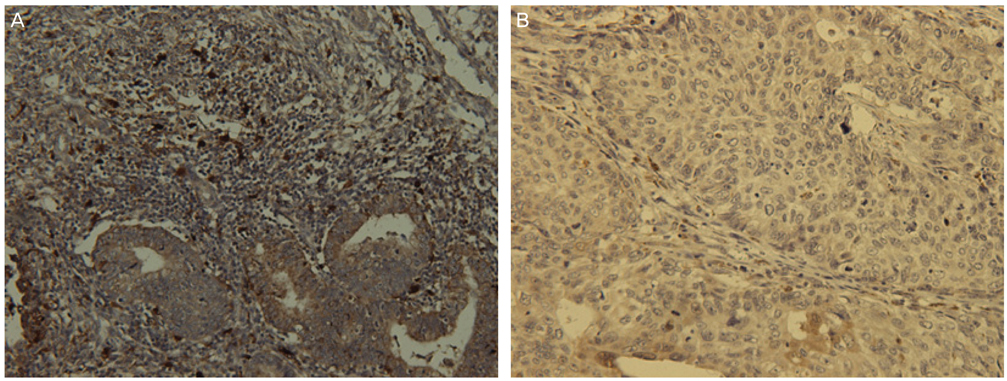Obstet Gynecol Sci.
2014 May;57(3):201-207. 10.5468/ogs.2014.57.3.201.
S100 expression in dendritic cells is inversely correlated with tumor grade in endometrial carcinoma
- Affiliations
-
- 1Department of Obstetrics and Gynecology, Pusan National University School of Medicine, Busan, Korea. ghkim@pusan.ac.kr
- 2Biomedical Research Institute and Pusan Cancer Center, Pusan National University Hospital, Busan, Korea.
- KMID: 1704426
- DOI: http://doi.org/10.5468/ogs.2014.57.3.201
Abstract
OBJECTIVE
The aim of this study was to determine the expression of S100 positive dendritic cells (DCs) and the relationship with clinicopathologic factors in endometrial carcinoma.
METHODS
Samples were collected from 89 patients with endometrial endometrioid adenocarcinoma treated in Pusan National University Hospital from 2004 to 2011. Normal endometrial tissues were obtained from 30 hysterectomized women with benign adnexal masses and served as controls. Paraffin-embedded sections were immunohistochemically stained for S100 was performed, and the number of positive DCs was counted. The relationship of these cells to the stage, histological grade, myometrial invasion, and lymph node metastasis was analyzed.
RESULTS
The proportion of S100-positive DCs in the endometrial endometrioid adenocarcinoma was 31.5% (28/89), which was significantly higher (P<0.05) than in the control group. The proportion of S100-positive DC expression was negatively correlated with the histologic grade, but was not associated with the stage, myometrial invasion, or lymph node metastasis.
CONCLUSION
High DC density was inversely correlated with histologic grade in endometrial carcinoma. Tumor-infiltrating S100+ DCs may be used as pathologic marker in endometrial carcinoma.
Keyword
MeSH Terms
Figure
Reference
-
1. Jung KW, Won YJ, Kong HJ, Oh CM, Seo HG, Lee JS. Cancer statistics in Korea: incidence, mortality, survival and prevalence in 2010. Cancer Res Treat. 2013; 45:1–14.2. Van der Horst PH, Wang Y, Vandenput I, Kuhne LC, Ewing PC, van Ijcken WF, et al. Progesterone inhibits epithelial-to-mesenchymal transition in endometrial cancer. PLoS One. 2012; 7:e30840.3. Gadducci A, Cosio S, Genazzani AR. Tissue and serum biomarkers as prognostic variables in endometrioid-type endometrial cancer. Crit Rev Oncol Hematol. 2011; 80:181–192.4. Movassagh M, Spatz A, Davoust J, Lebecque S, Romero P, Pittet M, et al. Selective accumulation of mature DC-Lamp+ dendritic cells in tumor sites is associated with efficient T-cell-mediated antitumor response and control of metastatic dissemination in melanoma. Cancer Res. 2004; 64:2192–2198.5. Maletzki C, Bodammer P, Breitruck A, Kerkhoff C. S100 proteins as diagnostic and prognostic markers in colorectal and hepatocellular carcinoma. Hepat Mon. 2012; 12(10 HCC):e7240.6. Stojanovic A, Cerwenka A. Natural killer cells and solid tumors. J Innate Immun. 2011; 3:355–364.7. Tavassoli FA, Devilee P. International Agency for Research on Cancer. World Health Organization. Pathology and genetics of tumours of the breast and female genital organs. Lyon: IAPS Press;2003.8. Honig A, Schaller N, Dietl J, Backe J, Kammerer U. S100 as an immunohistochemically-detected marker with prognostic significance in endometrial carcinoma. Anticancer Res. 2005; 25:1747–1753.9. Coppola D, Fu L, Nicosia SV, Kounelis S, Jones M. Prognostic significance of p53, bcl-2, vimentin, and S100 protein-positive Langerhans cells in endometrial carcinoma. Hum Pathol. 1998; 29:455–462.10. Coventry B, Heinzel S. CD1a in human cancers: a new role for an old molecule. Trends Immunol. 2004; 25:242–248.11. Wallace AE, Gibson DA, Saunders PT, Jabbour HN. Inflammatory events in endometrial adenocarcinoma. J Endocrinol. 2010; 206:141–157.12. Kara PP, Ayhan A, Caner B, Gultekin M, Ugur O, Bozkurt MF, et al. Analysis of dendritic cells in sentinel lymph nodes of patients with endometrial and patients with cervical cancers. Int J Gynecol Cancer. 2009; 19:1239–1243.13. Oka K, Nakano T, Arai T. Adenocarcinoma of the cervix treated with radiation alone: prognostic significance of S-100 protein and vimentin immunostaining. Obstet Gynecol. 1992; 79:347–350.14. Nagorsen D, Voigt S, Berg E, Stein H, Thiel E, Loddenkemper C. Tumor-infiltrating macrophages and dendritic cells in human colorectal cancer: relation to local regulatory T cells, systemic T-cell response against tumor-associated antigens and survival. J Transl Med. 2007; 5:62.15. Elagoz S, Arici DS, Aker H. Relationship between FIGO grade and AgNOR, S100-positive langerhans cells in endometrial adenocarcinoma. Pathol Int. 2000; 50:616–619.16. Bethwaite PB, Holloway LJ, Thornton A, Delahunt B. Infiltration by immunocompetent cells in early stage invasive carcinoma of the uterine cervix: a prognostic study. Pathology. 1996; 28:321–327.17. Karakok M, Bayazit YA, Ucak R, Ozer E, Kanlikama M, Mumbuc S, et al. Langerhans cell related inflammatory reaction in laryngeal squamous cell carcinoma. Auris Nasus Larynx. 2003; 30:81–84.18. Liska V, Vycital O, Daum O, Novak P, Treska V, Bruha J, et al. Infiltration of colorectal carcinoma by S100+ dendritic cells and CD57+ lymphocytes as independent prognostic factors after radical surgical treatment. Anticancer Res. 2012; 32:2129–2132.19. Nestle FO, Burg G, Fah J, Wrone-Smith T, Nickoloff BJ. Human sunlight-induced basal-cell-carcinoma-associated dendritic cells are deficient in T cell co-stimulatory molecules and are impaired as antigen-presenting cells. Am J Pathol. 1997; 150:641–651.20. De Jong RA, Leffers N, Boezen HM, ten Hoor KA, van der Zee AG, Hollema H, et al. Presence of tumor-infiltrating lymphocytes is an independent prognostic factor in type I and II endometrial cancer. Gynecol Oncol. 2009; 114:105–110.21. Lijun Z, Xin Z, Danhua S, Xiaoping L, Jianliu W, Huilan W, et al. Tumor-infiltrating dendritic cells may be used as clinicopathologic prognostic factors in endometrial carcinoma. Int J Gynecol Cancer. 2012; 22:836–841.22. Zhou LJ, Tedder TF. Human blood dendritic cells selectively express CD83, a member of the immunoglobulin superfamily. J Immunol. 1995; 154:3821–3835.
- Full Text Links
- Actions
-
Cited
- CITED
-
- Close
- Share
- Similar articles
-
- S100 Protein Positive Dendritic Cells in Liver Diseases
- Expression of c-erbB-2 and Distribution of S-100 Protein Positive Dendritic Cells in Squamous Cell Carcinoma of the Uterine Cervix
- Expression of p53 Protein in Endometrial Carcinoma
- Tumor-infiltration of T-lymphocytes is inversely correlated with clinicopathologic factors in endometrial adenocarcinoma
- Two Cases of Low Grade Endometrial Stromal Sarcoma



